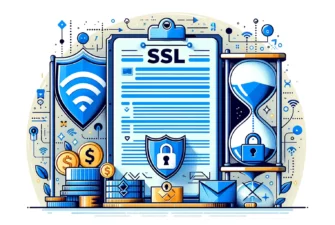
SSL certificates are now a common element of website building and browsing. What was once an expensive security measure for e-commerce and banking sites has become a ubiquitous sight all over the Web. Finding a website without the SSL padlock, it’s not that easy, with over 90% of sites loading over the secure HTTPS protocol. But what is an SSL certificate, and why it’s so important?
This article covers the SSL basics and explains how everything works in plain language. Understanding SSL certificates is essential for every user and website browser in today’s fast-evolving digital world. Let’s take it step-by-step.
Table of Contents
- What is SSL?
- What is an SSL Certificate?
- How Do SSL Certificates Work?
- How to Get an SSL Certificate?
- What Are the Different Types of SSL Certificates?
- Why Is an SSL Certificate Important?
What Is SSL?
SSL stands for Secure Sockets Layer, a cryptographic protocol for keeping online communications safe and secure. It establishes an encrypted connection between two applications over a network and prevents cyber thieves from intercepting sensitive data in transit.
SSL was the first technology used for Web encryption. Now, it’s deprecated and no longer supported by modern browsers and servers. SSL successor, TLS (Transport Layer Security), is the underlying protocol behind all SSL certificates.
Everyone still uses the “SSL” acronym next to certificates for simplicity and marketing reasons. SSL and TLS are interchangeable terms in the context of digital certificates. Learn more about the difference between SSL and TLS.
What Is an SSL Certificate?
An SSL certificate is a small digital file that authenticates the identity of a website and encrypts sensitive information exchanged between the website and the user’s browser. It’s issued by a private or public third-party Certificate Authority (CA) after the website owner completes a verification process. SSL certificates come in different types and levels of validation, but all serve the same purpose of securing online communication.
What Is an SSL Certificate Used for?
SSL certificates protect sensitive data such as login credentials, credit card numbers, and personal details when transmitted over the internet. They prevent attackers from intercepting private information and using it to run fraudulent schemes. On top of that, SSL certs help businesses comply with PCI (Payment Card Industry) requirements and adhere to the best SEO practices.
All websites, regardless of type, niche, and size, need an SSL certificate to remain accessible via modern browsers and visible on search engine results pages. Without an SSL certificate, browsers will flag the site as “Note Secure,” while visitors will receive an off-putting security warning.
You can tell if a website has an SSL certificate by looking for a padlock icon in your browser’s address bar or if the web address starts with “https” instead of “http.” The “s” stands for “secure.”
What Information Does an SSL Certificate Contain?
An SSL cert contains several pieces of information, including:
- the domain name of the website
- the company name and location
- the expiration date of the certificate
- the certificate provider’s name
- the public key that the website uses to encrypt data
It also includes the digital signature of the SSL certificate issuer, which confirms the certificate’s authenticity.
How Do SSL Certificates Work?
SSL certificates establish secure connections between a client and a server over the Internet. As a part of PKI infrastructure, they use the TLS protocol to encrypt the traveling data from readable plain text into an undecipherable string of random characters. As a result, hackers can’t gain access to it. At the same time, an SSL cert verifies the website or company’s identity via a trusted Certificate Authority authorized to validate and issue digital certificates for general use.
How Does the SSL Certificate Create a Secure Connection?
To create a secure connection, the client (a web browser, for instance) and the server first establish a handshake protocol in which they agree on the connection parameters, such as the protocol version and encryption algorithm. The server then sends its SSL certificate to the client, which contains its public key and other identifying information.
Next, the client verifies the certificate’s authenticity by checking its digital signature against a trusted certificate authority. Once the client has completed the check, it generates a unique session key to encrypt all data transmitted between the client and the server. The client encrypts the session key using the server’s public key, included in the SSL certificate and sends it to the server.
The server then uses its private key, which is only known to the certificate owner or applicant, to decrypt the session key. Once the server has the session key, it encrypts all data sent to the client. The client uses the same session key to decrypt the information.
This process ensures that data shared between the client and the server is encrypted and secure. If an attacker were to intercept the data, they would not be able to read it because they would not have the session key to decrypt it.
How to Get an SSL Certificate?
SSL certificates have never been more accessible. You can get a trusted cert within minutes from many places, including generating it yourself. However, self-signed certificates aren’t suitable for live environments, and no browsers will trust them.
The best place to get affordable SSL certificates for every need is an official SSL reseller like SSL Dragon. Such a third-party company is a distribution partner of the leading Certificate Authorities. This privilege allows them to buy digital certificates in bulk at highly-discounted prices and pass the savings to the final customer. As a result, the SSL certificate cost is significantly lower than the market average.
Once you select an SSL cert for your website, your vendor will walk you through the buying process, which includes CSR generation and submission to the CA for validation.
After the Certificate Authority signs your SSL certificate and sends the necessary files via email, you can download and install the SSL on your server. Finally, you must enforce the HTTPS connection across your website to complete the SSL configuration.
What Are the Different Types of SSL Certificates?
The easiest way to classify SSL certificates is by validation type and what they secure. Below we’ve covered each category in more detail.
By Validation
SSL certificate validation is the process of verifying the identity of the SSL applicant. It ensures that the SSL cert is issued to the rightful owner of the domain. When an organization or individual requests an SSL certificate, they must provide certain information to the Certificate Authority, such as their name, organization name, and domain. The CA will then perform various checks to verify the details, depending on the chosen type of validation.
SSL Validation comes in three levels:
- Domain Validation. Domain Validation (DV) certificates verify that the individual or organization requesting the SSL certificate owns or controls the domain name they want to secure. The DV process is automated and doesn’t require any paperwork. You can get a DV cert in less than five minutes. Such validation suits entry-level websites, blogs, or businesses that don’t process online payments.
- Organization Validation. During organization validation (OV), the CA performs additional checks to confirm the legal existence and physical location of the SSL applicant. Only officially registered companies can request OV certificates after providing the relevant documentation to the CA. OV SSL certs are perfect for e-commerce platforms, non-profits, and medium-sized businesses. You can get an OV certificate in 1-2 business days, providing all your legal details are up to date.
- Extended Validation. Extended Validation requires a thorough vetting process and offers the highest assurance that the company requesting the certificate is genuine. On top of that, EV certificates protect against phishing attacks and include the organization’s legal name in the certificate’s details. EV SSL is the best option for large enterprises, electronic money institutions, fintech companies, and the banking industry. You can get an EV certificate in 1 to 3 business days or even faster with LEI codes.
By What a Certificate Secures
SSL certificates can secure anything from a single domain to multiple websites with unlimited subdomains. Moreover, some certificates can protect a public IP address and digitally sign emails and documents.
- One Domain SSL Certificates. One domain SSL certificates secure a single domain name or subdomain such as example.com or blog.example.com (without the main domain).
- Wildcard SSL Certificates. A wildcard SSL certificate secures one domain and all subdomains under a single SSL installation. When ordering a Wildcard cert, all you have to do is add an asterisk (*) in front of the domain name, and it will cover all your subsequent subdomains. For instance, *.example.com.
- Multi-Domain SSL Certificates. A multi-domain certificate, also called SAN (Subject Alternative Name) or UCC (Unified Communication Certificate), secures multiple domains under one installation.
- Multi-Domain Wildcard Certificates. A multi-domain wildcard certificate protects multiple domains and all their subdomains at once. It’s the most versatile type of SSL certs and the best choice to secure multi-level subdomains like blog.marketing.example.com.
- IP Address SSL Certificates. An IP address SSL certificate secures a public IP instead of a hostname, for example, 1.12.123.124. Private IPs are not supported.
- Email Certificates. Email SSL certificates secure email communications and verify the sender’s identity. They ensure content integrity and are available for personal and corporate use.
- Document Signing Certificates. A Document Signing certificate digitally signs electronic documents. It authenticates the author’s identity and protects the contents from being altered by an unauthorized source.
Why Is an SSL Certificate Important?
SSL certificates are essential for any website that wants to provide safe browsing to users. Here are the benefits of SSL certificates.
- User data protection. SSL certificates encrypt sensitive data, such as login credentials, credit card information, and personal details. As a result, hackers can’t intercept and steal these details. SSL certs offer users peace of mind when using your website.
- SEO rankings remain intact. Google penalizes websites that don’t have an SSL certificate by issuing a security warning to visitors. If you want your site to be accessible and visible on search engine results pages, you must add an SSL certificate.
- Enhanced trust. Business Validation and Extended Validation SSL certificates offer higher customer trust by authenticating the company’s legal identity. A business vetted by a trusted third-party CA is more likely to attract and keep customers.
- Phishing attack prevention. EV SSL certificates also help prevent phishing attacks, where hackers attempt to steal sensitive information by impersonating a trusted website. By authenticating business identity, EV certificates ensure users browse the genuine website.
Conclusion
In this article, we’ve answered the “What are SSL certificates?” question by covering the SSL fundamentals, from the cryptographic protocols to validation types and everything in between. An SSL or TLS certificate is indispensable to website building and web encryption. Now, it’s easier than ever to secure your website and follow the latest security and SEO practices. As the digital world evolves, new threats emerge targeting users’ sensitive data, but thanks to unbreakable encryption, SSL certificates are keeping it safe.
Frequently Asked Questions
SSL (Secure Sockets Layer) and TLS (Transport Layer Security) are cryptographic protocols that establish a secure and encrypted connection between a web server and a client. TLS is an improved version of SSL and the standard protocol today. Due to security vulnerabilities, SSL is no longer supported.
Copy Link
The SSL certificate cost varies depending on the validation type and the certificate authority (CA) that issues it. Generally, prices range from a few dollars for entry-level DV certificates to hundreds or even thousands per year for more advanced SSL options.
Copy Link
You can tell if a site has an SSL cert by looking at the URL in the browser’s address bar. If the URL starts with “https://” instead of “http://” and a padlock icon is next to the URL, then the site is using a valid certificate.
Copy Link
A self-signed SSL certificate can be issued by anyone rather than a trusted third-party Certificate Authority. While these certificates provide encryption, web browsers don’t trust them and display a warning to the users. Self-signed certs are not suitable for live production.
Copy Link
A shared SSL certificate secures multiple websites on the same server and IP address. It doesn’t belong to the client but to hosting providers or content delivery networks that offer SSL encryption to their customers without requiring each client to purchase or configure their own certificate.
Copy Link
Save 10% on SSL Certificates when ordering today!
Fast issuance, strong encryption, 99.99% browser trust, dedicated support, and 25-day money-back guarantee. Coupon code: SAVE10



























